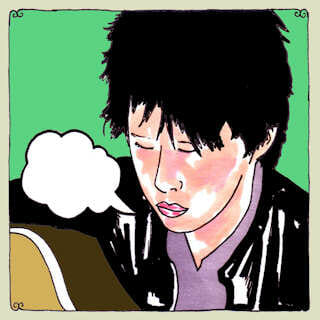- Welcome to Daytrotter
- Shaken
- Don’t Let The Devil Take Your Mind
- I Don’t Live In A Dream
- Like A Ball And Chain
Jackie Greene is a young man, still, and will be for a number of years yet – a decade or more even. He’ll be able to claim youth and he’ll look it, albeit with deeply grooved sacks beneath his eyes. The San Franciscan musician is not of his years though, unsure of his true age. His insides, the parts that house and encase his soul – one that’s deeper than a smokestack – must have rings around them, so many in fact, that if he were chopped down like a common tree and about to be made into paper products or a house in the suburbs, they would peg him to be someone in their mid-to-late 80s or more. He would likely even fess up to it, not feeling as if he were being such a deceptive subject. He could claim to being a sharecropper, to being a preacher or a preacher’s son, a defector or a pool shark, a hobo, a railway hopper, a coal miner, a freedom fighter, a first or third generation hippie and no eyes would be batted or rolled. Greene is a songwriter and musician steeped in the glorious psychedelic and bluesy infatuation of the early and mid-70s when the Rolling Stones were working themselves up a sound that was heavy on borrowing from the rich and living music of black America, the blues and traditionals coming from the painfully echoing cotton and tobacco fields, played by hands stained with tar and sung by men who were doing everything they could not to be broken. He’s steeped in those early beginnings of the hybrid when Paul McCartney was just trying to emulate Little Richard and Chuck Berry, when the music felt as if it was torched with personality and not just a representation or facsimile of it. On “Giving Up The Ghost,” Greene, who frequently collaborates with Grateful Dead founding member Phil Lesh, shows himself and his tight band to be the embodiment of a man fearful of the devil and all his crooked temptations, the balls and chains of possessive women and the many vices and sins that come window-shopping for spoils. His sensibilities lean toward the sharply-worded vignettes of someone who’s experienced far more than a guy one-fourth his age, coming across as someone who’s buried all of his relatives and peers, been divorced three or four times, seen eight different presidential administrations and been estranged by his children, left to warn and left to soak in all of the feelings and moody moments that tend to accompany any of those wayward circumstances. The songs on the album aren’t overly forlorn or downtrodden, just anchored by the kinds of learned sadness that become unshakable or irremovable barnacles that just get looked at and felt forever more. He sings, “No one man among us, is safe from the siren’s call…Well, the world’s so damp it’s beginning to swim,” and it sounds as if it’s derived from so many strikeouts, from so many times through the fires, catching the very whites of the devil’s eyes and glared at the smirk. It takes on the feel of something like a grandfatherly looking tree, twisting in an electric sky, knowing that its roots are sunk down into the ground four stories and nothings going to shake it to death that night, giving Greene’s music a patience that’s reminiscent of the kinds of moonlit blues that could come when the tensions break.
